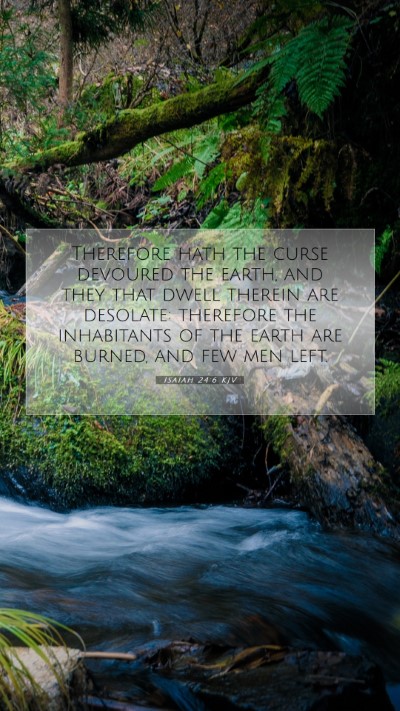Understanding Isaiah 24:6
In this section, we will explore the Bible verse meaning of Isaiah 24:6, providing insights derived from various public domain commentaries, including those by Matthew Henry, Albert Barnes, and Adam Clarke. This verse, part of a larger prophetic declaration, reflects on the consequences of sin and the judgment upon the earth.
Verse Text
Isaiah 24:6 (KJV): "Therefore hath the curse devoured the earth, and they that dwell therein are desolate: therefore the inhabitants of the earth are burned, and few men left."
Commentary Insights
- Matthew Henry:
Henry emphasizes the devastating impact of sin on the world. The curse spoken of is the result of humanity’s rebellion against God’s commandments. The earth is in a state of desolation, reflecting the moral and spiritual decay of its inhabitants. Henry points out that this chapter depicts a time of great calamity, where the consequences of sin lead to widespread destruction.
- Albert Barnes:
Barnes interprets the 'curse' as a divine judgment that affects the entirety of the earth and its people. He notes that the phrase "few men left" is a stark reminder of the severity of God’s wrath against unrepentant sin. Barnes emphasizes the theme of accountability, teaching that divine justice requires a reckoning for actions taken against God's will.
- Adam Clarke:
Clarke provides a perspective on the prophetic nature of Isaiah’s message, suggesting that this warning serves as both a lament and a lesson for future generations. He discusses the physical and spiritual implications of the curses and contrasts them with the hope of restoration for those who turn back to God. Clarke also highlights the significance of 'burned' as a metaphor for purification through suffering.
Interpretation and Themes
The essence of Isaiah 24:6 lies in the profound understanding of Bible verse interpretations. This verse serves as a reminder of the grim realities that arise when humanity turns away from God. Here are some synthesized themes from the commentaries:
- Divine Judgment: The consequences of sin are serious, affecting not only individuals but all of creation.
- Moral Responsibility: Each person is accountable for their actions, and there is a call to recognize one’s sinfulness.
- Hope for Restoration: Despite the grim realities, there is an inherent message of hope for those who seek redemption.
Analysis of Key Terms
Studying Isaiah 24:6 requires a closer examination of its key terms to grasp the full Bible verse understanding.
- Curse: Signifies a pronounced judgment, representing the broken relationship between God and creation.
- Desolate: Describes the state of emptiness and ruin that follows disobedience to God.
- Burned: Implies a purging of sin, indicating the intensity of God’s actions to restore righteousness.
Cross References
Isaiah 24:6 is related to several other key verses that enrich our understanding:
- Genesis 3:17-19: The curse following Adam's sin, describing the fallen state of the world.
- Romans 8:22: The groaning of creation due to the effects of sin.
- Revelation 21:1: The promise of a new heaven and new earth where righteousness dwells.
Application to Daily Life
Based on this verse, we can derive several practical applications for Bible study lessons:
- Recognize the reality of sin in your life and seek God’s forgiveness.
- Understand the importance of living in accordance with God’s will to avoid destructive consequences.
- Embrace the hope of restoration and renewal through faith in Christ.
Conclusion
Isaiah 24:6 serves as a powerful reminder of the significance of scripture in understanding the consequences of sin and the grace offered through repentance. Engaging with this verse through Bible verse commentary not only enhances our biblical literacy but also informs how we live out our faith in a world that often seems desolate.
As we reflect on these insights, may we approach the Scriptures with a desire for deep Biblical exegesis and enrich our Bible study resources for personal growth and understanding of God’s Word.


